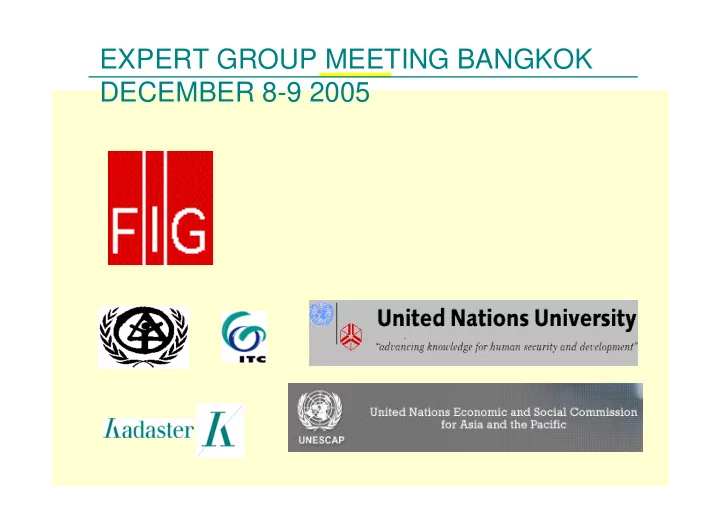

EXPERT GROUP MEETING BANGKOK DECEMBER 8-9 2005
Venue & Participation & Date • UN Conference Centre, Bangkok • About 50 participants - 20 countries - 22 papers • December 8-9 2005
Organising Committee • Yap Kieo Sheng, UNESCAP, Bangkok • Clarissa Augustinus, UN/Habitat, Nairobi • Adnan Hameed Aliani, UNESCAP Bangkok • Asa Jonsson, UNESCAP, Bangkok • Jan Meeuwissen, UN/Habitat, Fukuoka • Paul/Pauline/Christiaan, FIG Commission 7
Conclusions: Land is a political issue • UN/ECE 1996 Land Administration Guidelines • FAO 2002 Land Tenure and Rural Development • UN/Habitat 2003 Handbook on Best Practices, Security of Tenure and Access to Land • UN/Habitat 2003 Pro Poor Land Management
Land: a politicial issue • World Bank 2003 Land Policies for Growth and Poverty Reduction • EU 2004 Guidelines to support land policy design and reform processes in developing countries • World Bank 2005 Doing Business: Remove Obstacles to Growth
Land: a political issue • Germany, 1998, Land Tenure in Development Cooperation • UK, 2002, Better livelihoods for people: the role of Land Policy • Netherlands, 2003, Mutual Interests, Mutual responsibilities
Conclusions:Common approach needed • Only innovative institutional arrangements can cope with increasing populations, greater investments in land, economic growth and more social welfare. • Lack of these arrangements lead to land grabbing, conflict, resources misuse, undermines productive and economic potential.
What to do? • Exclusive focus on formal title proven inappropriate • Much greater attention to existing institutional arrangements • Stronger rights for women, herders, indigenous people • Avoid uncritical emphasis on land sales markets • Rental markets provide more equity, productivity, long term investments, if restrictions are eliminated
What to do? • Land reform can only be fully utilized if requirements and scope of intervention is carefully compared with others • Land issue is part of a broader development policy
Conclusions: Impact on land administration • Innovative definition of property rights • Simple procedures, quick, and low transaction costs • Simple transparent systems, participatory • Low cost • Efficient and effective • Free from political pressure • Low cost demarcation • Mechanisms conflict resolution • SDI at low cost, transparent and accessible for linking registers of different categories and at different levels
Conclusions: some examples • Analiza Rebualta-Teh • Bagadai Naranchimeg • Thilak Hewawasam • Sovann Sar • Danh Hung Vo • Vilaphone Virachit • Jude Wallace • Pedro de Sousa • Siraj Sait • TRung Tran Nhu • Paul Rabé • Evelyn Tehrani • Bo Gustafson • Debolina Kundu • van der Molen/Lemmen • Chris Lunnay • ArbindTuladhar • Benny • Spike Boydell • Augustinius • Rajasekhar • Bell
Impact Commission 7 workplan • Social Land Tenure • Pro poor land land administration • Pro-poor land management • Gendered approach • Community involvement • ICT application
Recommend
More recommend